

People Can Be So Fake: A New Dimension to Privacy and Technology Scholarship by Ryan Calo. This article updates the traditional discussion of privacy and technology, focused since the days of Warren and Brandeis on the capacity of technology to manipulate information.
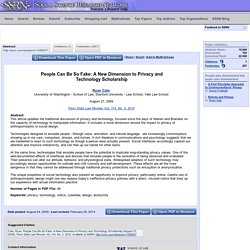
It includes a novel dimension around the impact to privacy of anthropomorphic or social design. Technologies designed to emulate people - through voice, animation, and natural language - are increasingly commonplace, showing up in our cars, computers, phones, and homes. A rich literature in communications and psychology suggests that we are hardwired to react to such technology as though a person were actually present. The Drone as Privacy Catalyst - Stanford Law Review.
Focus on Human Decisions, Not Technological Ethics of Police Robots. Ryan Calo is a professor of law at the University of Washington.
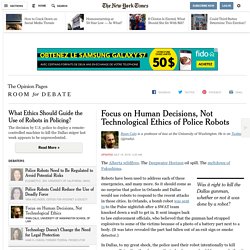
He is on Twitter (@rcalo). The Alberta wildfires. The Deepwater Horizon oil spill. Ryan Calo Raises Ethical Issues around Robots and the Remote-Controlled Use of Force. A recent New York Times “Room for Debate” segment raised questions around the militarization of police and the ethical implications of remote-controlled use of force.
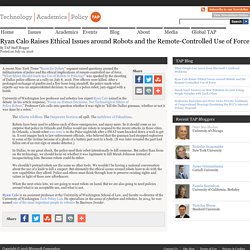
“What Ethics Should Guide the Use of Robots in Policing?” Was sparked by the shooting of Dallas police officers at a rally on July 8, 2016. Five officers were killed. Audio: Police robots: Departments lack rules on whether they can kill. Law enforcement agencies around Southern California own and operate military-style robots—but few have policies on when and how to use them, including on whether the machines can be used to kill.
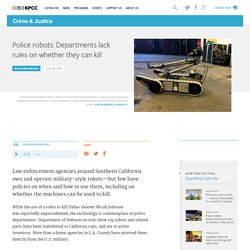
While the use of a robot to kill Dallas shooter Micah Johnson was reportedly unprecedented, the technology is commonplace at police departments. Department of Defense records show 194 robots and related parts have been transferred to California cops, and are in active inventory. More than a dozen agencies in L.A. County have received them directly from the U.S. military. KPCC asked the four agencies with the most military-supplied robots for their policies. There's no question, however, that the robots are being used more and more often. 'An extremely valuable tool' Generally, robots at law enforcement agencies are used to gather intelligence in dangerous situations.
"Can Americans Resist Surveillance?" by Ryan Calo. Abstract This Essay analyzes the ability of everyday Americans to resist and alter the conditions of government surveillance.
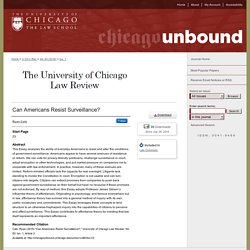
Americans appear to have several avenues of resistance or reform. We can vote for privacy-friendly politicians, challenge surveillance in court, adopt encryption or other technologies, and put market pressure on companies not to cooperate with law enforcement. Museum of Drones. Robotics-law expert Ryan Calo weighs in on drone regulations. Hard cases, said a long-ago Supreme Court justice, make bad law.
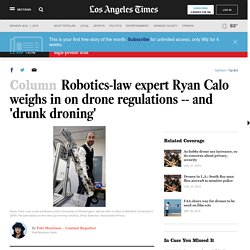
Ryan Calo. Robotics-law expert Ryan Calo weighs in on drone regulations. Should You Be Allowed to Prevent Drones From Flying Over Your Property? Drone use across the U.S. is soaring, and the skies may soon get even more crowded, as the Federal Aviation Administration expects sales of these unmanned aerial vehicles to jump to seven million in 2020 from about 2.5 million this year.
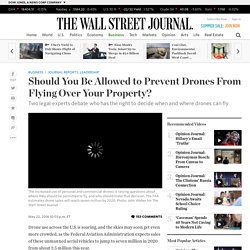
Interest in drones for both commercial and casual purposes is raising not only safety and privacy concerns, but also thorny legal questions about where and when drones should be allowed to fly—and who gets to decide. On one side are those who say property owners’ rights generally extend up about 500 feet, which gives them the right to prevent drones from flying or hovering over their land. They say drones pose a much bigger threat to security and privacy than jets and airplanes, which travel at higher altitudes, in airspace regulated by the FAA. Others aren’t so sure. The Drone as Privacy Catalyst by Ryan Calo. University of Washington - School of Law; Stanford University - Law School; Yale Law SchoolDecember 12, 2011 Stanford Law Review Online, Vol. 64, pp. 29-33 (2011) Abstract: Samuel Warren and Louis Brandeis could describe what a privacy violation looked like: sensational journalists armed with newly developed “instantaneous photographs” splashing pictures of a respectable wedding on the pages of every newspaper.
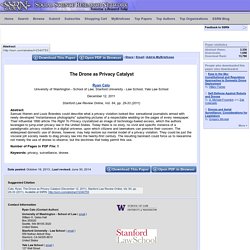
Their influential 1890 article The Right To Privacy crystallized an image of technology-fueled excess, which the authors leveraged to jump-start privacy law in the United States. Ten Myths About Drones. Unmanned aerial vehicles (“UAVs”), often called “drones,” are coming to American skies.
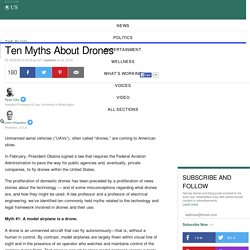
In February, President Obama signed a law that requires the Federal Aviation Administration to pave the way for public agencies and, eventually, private companies, to fly drones within the United States. The proliferation of domestic drones has been preceded by a proliferation of news stories about the technology — and of some misconceptions regarding what drones are, and how they might be used. A law professor and a professor of electrical engineering, we’ve identified ten commonly held myths related to the technology and legal framework involved in drones and their use. Myth #1: A model airplane is a drone. A drone is an unmanned aircraft that can fly autonomously—that is, without a human in control. Myth #2: Drones are no different than street surveillance cameras. Myth #3: Drones can only stay in the air for a short amount of time.
A conversation on the ethics of Dallas police's bomb robot. Today we learned the Dallas police used a bomb disposal robot to deliver and detonate an explosion, killing the suspect in last night's shooting.
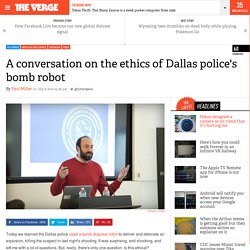
It was surprising, and shocking, and left me with a lot of questions. But, really, there's only one question: is this ethical? Interview: Ryan Calo – Center for the Study of the Drone. Ryan Calo speaking at the Drones and Aerial Robotics Conference. Credit: NYU Engleberg Center via Youtube Ryan Calo is an Assistant Professor of Law at the University of Washington.
Ryan Calo: Robot Regulation in 3 Simple Graphs (Drones & Aerial Robotics Conference) Meet the Guy Running Our Robot Future. Robotics-law expert Ryan Calo weighs in on drone regulations — and ‘drunk droning’ Drones and privacy: A looming threat. UNMANNED aircraft, otherwise known as drones, are becoming common. A Drone Scholar Answers the Big Questions About Amazon's Plans. After Amazon's Jeff Bezos announced that his company wanted to deliver packages with small unmanned aerial vehicles, many people have questioned the viability and wisdom of the idea. Yesterday, we got one optimistic perspective from Andreas Raptopoulos, an entrepreneur who founded Matternet, which is developing drone-delivery technology. But there are many other ways to answer the questions that I posed to Raptopoulos. So, today, we bring you an interview with the University of Washington's Ryan Calo, who has become a leading authority on the ethical and policy implications of emerging technologies.
Specifically, he's focused on the problems at the nexus of drones and privacy in recent months. To offer the most intriguing parallels, I tried to keep my questions to Calo as similar to the ones as I posed to Raptopoulos as possible. What rationale do companies like Amazon and Matternet give for creating drone-delivery networks? Some people are saying Mr.